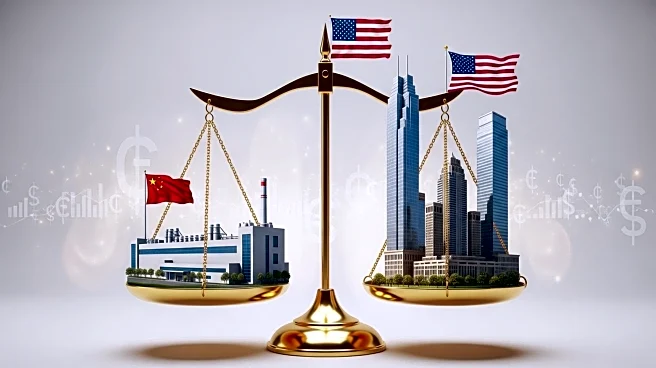What is the story about?
What's Happening?
China's exports to the United States experienced a significant decline of 33% in August, marking the weakest growth in six months. This downturn is attributed to President Trump's stringent measures against transshipments and the diminishing effects of previously frontloaded exports. The overall export growth for China slowed to 4.4% in August, missing economists' expectations of a 5.0% rise. This slowdown follows a period of rapid growth last year, which created a high statistical base. Imports from the U.S. also fell by 16% compared to the previous year, while China's imports overall rose by 1.3%, missing the anticipated 3% growth.
Why It's Important?
The decline in China's exports to the U.S. highlights the ongoing impact of President Trump's trade policies, which have introduced higher tariffs and stricter regulations on shipments. This situation poses challenges for China's export-driven economy, potentially affecting its growth momentum. The reduced export figures could lead to increased economic pressure on China, influencing its trade strategies and negotiations with the U.S. Additionally, the broader implications for global trade dynamics are significant, as other countries may adjust their trade policies in response to these developments.
What's Next?
With the temporary boost from the U.S.-China trade truce fading, exports are expected to face further pressure. Analysts predict that the U.S. will continue to enforce tariffs on rerouted shipments, which could exacerbate the slowdown in China's export growth. The Chinese government may need to explore alternative markets or adjust its economic policies to mitigate the impact of reduced exports to the U.S. Furthermore, ongoing trade negotiations between the two countries will be crucial in determining future trade relations and economic outcomes.
Beyond the Headlines
The current trade dynamics between the U.S. and China could lead to long-term shifts in global supply chains. Companies may seek to diversify their sourcing and manufacturing locations to reduce dependency on any single country. This could result in increased investment in other regions, potentially altering the global economic landscape. Additionally, the trade tensions may prompt discussions on the ethical and legal aspects of international trade policies, influencing future regulatory frameworks.

















